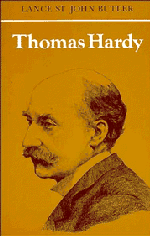Book contents
1 - ‘Life offers – to deny!’
Published online by Cambridge University Press: 03 May 2011
Summary
The only honest answer to the question ‘What are Hardy's novels and poems about?’ is that they are about love. There is a temptation to think that Hardy's main concern is agricultural, provincial, sociological; that his work is about Wessex and the traditional ways of Wessex life. Raymond Williams, for instance, argues a sophisticated version of this case, pointing out that although Hardy is not a peasant chronicler of peasant tales (there were no real peasants in nineteenth-century Dorset) we should see him ‘in his real identity: both the educated observer and the passionate participant in a period of general and radical change’. Now it is true that there is a tension in Hardy between the ‘educated’ voice and the Wessex dialect, and a tension between old ways and new methods, and a tension between the social classes; but these are images or examples of the fundamental tension – which is that between the possible and the actual. And this basic issue appeared to Hardy most forcibly not in social or economic life but in the realm of love.
Among all creatures man alone has a view of the possible; so only man observes how far short of the possible the actual falls; this is the curse of consciousness. All other beings live by one law – the law of nature, evolution, what Hardy calls the Immanent Will. Man lives by two laws – the law of nature and the law of his own desires and aspirations.
- Type
- Chapter
- Information
- Thomas Hardy , pp. 6 - 11Publisher: Cambridge University PressPrint publication year: 1978



